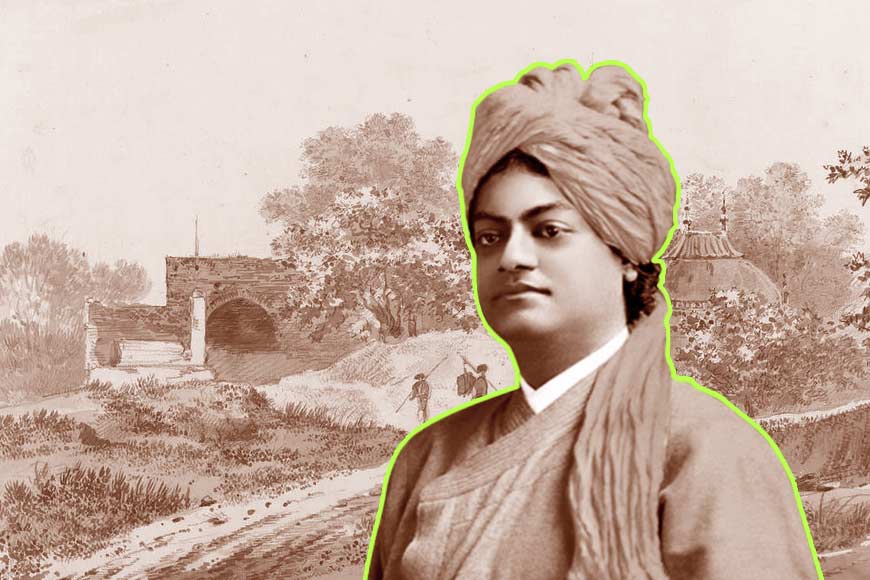The untold story of Vivekananda’s visit to Ghazipur – GetBengal story

In the late 19th century, Bengal was also the birthplace of a great spiritual awakening, including poets and revolutionaries. During his travels in 1890, Swami Vivekananda met many different kinds of people—monks, businessmen, teachers, professors, government officials, nationalists, Christian priests, and Muslim scholars. But Vivekananda had long heard about Pavhari Baba, the famous mystic and saint of Ghazipur, and wanted to meet him. Therefore, while staying in Allahabad in January 1890, he decided to visit Ghazipur to see the Baba in person.
Pavhari Baba was a Hindu ascetic renowned for his calm spirit, simplicity, and deep compassion. Living in quiet solitude near Ghazipur, he devoted his days to meditation, prayer, and serving others. It is said that he survived on little more than air and fruits—hence the name “Pavhari,” meaning “air-eater.” His presence radiated peace; even those who met him briefly felt an inner stillness.
In 1890, Swami Vivekananda, then still known as Narendranath Dutta, was going through a period of intense inner turmoil. After the passing of his beloved guru, Sri Ramakrishna Paramahamsa, he wandered across India, searching for truth, purpose, and peace. When he arrived in Ghazipur, destiny led him to Pavhari Baba’s ashram.
After several days of trying, Swami Vivekananda finally had the opportunity to meet Pavhari Baba. The encounter left a deep impression on him. In a letter to his friend Pramadababu dated February 4, 1890, he wrote:
“Through supreme good fortune, I have obtained an interview with Babaji—a great sage indeed! It is all very wonderful, and in this atheistic age, a towering representation of marvellous power born out of Bhakti and Yoga! I have sought refuge in his grace, and he has given me hope—a thing very few may be fortunate enough to obtain. It is Babaji’s wish that I stay on for some days here, and he would do me some good. So, following this saint’s bidding, I shall remain here for some time.”
Swami Vivekananda moved closer to his hermitage and began practicing severe austerities. During this period, he fell ill and suffered physically. Though he had come to Pavhari Baba seeking initiation into Raja Yoga, he felt that he was not making much progress. The Baba didn't talk much, and when he did, his words were few and indirect. Vivekananda's restlessness increased as the days went by in silence. Additionally, he started seeing visions of Sri Ramakrishna, his guru, which left him feeling conflicted between confusion and guilt.
Eventually, Swamiji decided that perhaps there was nothing more for him to learn from Pavhari Baba. In another letter to Pramadababu, dated March 3, 1890, he wrote:
“But now I see the whole matter is inverted in its bearings! While I myself have come, a beggar at his door, he turns round and wants to learn of me! This saint perhaps is not perfected — too much of rites, vows, observances and too much of self-concealment. The ocean in its fullness cannot be contained within its shores, I am sure. So it is not good; I have decided not to disturb this sadhu for nothing, and very soon I shall ask leave of him to go.”
After leaving Ghazipur, Swami Vivekananda regained clarity and peace of mind. He devoted himself to single-minded meditation and spiritual discipline. Some of his brother disciples believed that his stay with Pavhari Baba was a distraction from Sri Ramakrishna’s path. However, this experience actually reflected Vivekananda’s open-mindedness — his willingness to explore different perspectives and his deep commitment to discovering truth in all its forms.
According to Sister Nivedita, Pavhari Baba passed away in 1898 in an act of self-immolation — a mysterious and profound symbol of ultimate renunciation. While his life ended in silence, his influence echoed in the voice of Swami. His encounter with Pavhari Baba, though brief and complex, became an important step in shaping the Swami’s spiritual maturity.
Source:
https://www.swamivivekananda.guru/2017/05/22/swami-vivekananda-and-pavhari-baba/
https://vivekavani.com/pavhari-baba-ghazipur/










